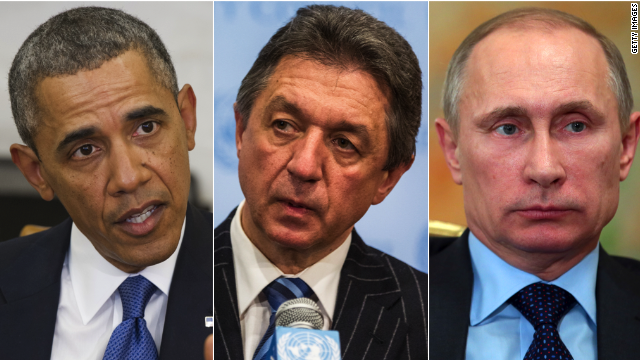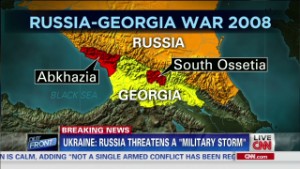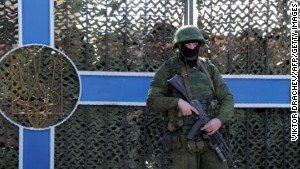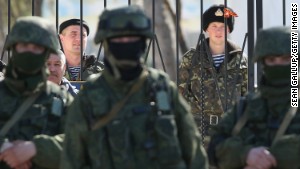Ukraine crisis: What's happening? Depends on whom you ask
March 4, 2014 -- Updated 0331 GMT (1131 HKT)

U.S.
president Barack Obama, Ukraine Ambassador to the United Nations Yuriy
Sergeyev, and Russian president Vladimir Putin have very different
stories over what's happening in Ukraine.
As ideological battle
lines are drawn around the world over the situation, leaders are
painting vastly different pictures of the realities on the ground.
Here are some of the questions at play, with a look at how key players are weighing in:
.
Who's in charge of Ukraine?

How far will Putin go in Ukraine?

Can bloodshed be prevented in Crimea?

Crimea downplays Russian ultimatum
.
Russia's take: Viktor
Yanukovych remains Ukraine's elected leader, and Ukraine's new
government is illegitimate. Russian United Nations envoy Vitaly Churkin
called it an "armed takeover by radical extremists."
Ukraine's take: Ukraine
has a legitimate government and is set to have new presidential
elections on May 25. "Let's give an opportunity for that to work,"
Ukrainian Ambassador to the U.N. Yuriy Sergeyev said.
United States' take:
Yanukovych abandoned his post last month, fled the country and was then
voted out of office by Ukraine's democratically elected parliament.
.
How many Russian troops are inside Ukraine?
Russia's take: Russia hasn't said how many troops it's sent into Ukraine.
Ukraine's take: Russia
has sent military ships, helicopters and cargo planes to deploy 16,000
troops into Crimea since February 24, Sergeyev told the United Nations
on Monday.
United States' take:
Russian forces "have complete operational control of the Crimean
peninsula," a senior U.S. administration official told CNN on Sunday,
with estimates of 6,000 Russian ground and naval forces in the region
.
Do Russian troops have a right to be in Crimea?
Russia's take: Yes. A
treaty between the neighboring nations allows Russia to have up to
25,000 troops in Crimea, Russia's U.N. envoy said Monday, adding that
Yanukovych requested that Russia send military forces.
Ukraine's take: No. Russian troops amassing in Crimea and near the border with Ukraine are an "act of aggression."
United States' take: No,
and Russian President Vladimir Putin is playing a dangerous game. The
consequences of military action "could be devastating," U.S. Ambassador
to the U.N. Samantha Power said Monday.
.
Why is the tense standoff unfolding now?
Russia's take: Russia
has said its parliament approved Putin's use of military force to
protect Russian citizens in the Crimean peninsula.
Ukraine's take: There's no evidence of any threat to Russians inside Ukraine. Russia wants to annex Crimea.
United States' take:
Russia is responding to its own historic sensitivities about Ukraine,
Crimea and their place in Moscow's sphere of influence, a senior White
House official told CNN Monday. Russia fears that Ukraine is falling
under European or Western influence, the official said.
CNN's Jim Acosta and Dana Ford contributed to this report.

No comments:
Post a Comment